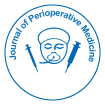
Journal of Perioperative Medicine
Open Access
ISSN: 2684-1290

ISSN: 2684-1290
Opinion Article - (2023)Volume 6, Issue 2
Open globe injuries are serious ocular emergencies that require prompt surgical intervention to prevent vision loss or even blindness. General anesthesia is commonly used for the surgical repair of open globe injuries, providing the necessary analgesia, muscle relaxation, and airway control for safe and effective surgery. However, the use of general anesthesia in these cases requires careful consideration and management to minimize potential risks and complications. This article provides an overview of best practices and considerations for the use of general anesthesia in the surgical repair of open globe injuries.
Patient evaluation and preparation
Before undergoing general anesthesia, the patient must undergo a thorough evaluation and preparation process. This includes a detailed medical history, physical examination, and laboratory tests to assess the patient's overall health status and identify any potential risks or contraindications for general anesthesia. The patient must also be appropriately fasted and hydrated before the surgery, and preoperative medications should be administered as necessary to manage pain, anxiety, or other medical conditions.
Airway management
Airway management is a critical aspect of general anesthesia for open globe injuries. The anesthesiologist must ensure adequate oxygenation and ventilation during the surgery, while also protecting the patient's airway from potential injury or obstruction. The use of endotracheal intubation or a laryngeal mask airway may be necessary in some cases, particularly if the patient's airway is compromised or if the surgery is prolonged.
Anesthetic agents
The selection of anesthetic agents for general anesthesia in open globe injuries must be carefully considered based on the patient's medical history, risk profile, and surgical requirements. The use of intravenous induction agents, such as propofol or etomidate, is commonly used to initiate anesthesia, while volatile anesthetics, such as sevoflurane or desflurane, may be used to maintain anesthesia. Opioids, such as fentanyl or remifentanil, may be administered for analgesia, while muscle relaxants, such as succinylcholine or rocuronium, may be used to facilitate intubation and maintain muscle relaxation during the surgery.
Monitoring and support
The anesthesiologist must continuously monitor the patient's vital signs and level of anesthesia during the surgery. This includes monitoring of blood pressure, heart rate, oxygen saturation, and end-tidal carbon dioxide levels. The anesthesiologist must also be prepared to manage potential complications or adverse events, such as hypotension, hypoventilation, or allergic reactions. Emergency equipment and drugs, such as oxygen, a defibrillator, or epinephrine, must be readily available and the anesthesiologist must have the training and expertise to manage these situations.
Postoperative care
After the surgery, the patient must be closely monitored and managed to ensure a safe and successful recovery. The patient's vital signs must be monitored and managed appropriately, and postoperative medications, such as analgesics or antiemetics, must be administered as needed. The patient should be provided with appropriate instructions for care and follow-up, including instructions for eye care, wound care, and medication management.
The use of general anesthesia for the surgical repair of open globe injuries requires careful consideration and management to ensure patient safety and successful outcomes. This includes a thorough patient evaluation and preparation process, appropriate airway management, careful selection of anesthetic agents, continuous monitoring and support during the surgery, and appropriate postoperative care. The anesthesiologist must have the training, expertise, and resources necessary to manage potential risks and complications, and must be prepared to adapt to the unique challenges and requirements of each patient and each surgical case.
Citation: Degu S (2023) General Anesthesia for the Surgical Repair of Open Globe Injuries: An Overview of Best Practices and Considerations. J Perioper Med. 6:162.
Received: 01-Mar-2023, Manuscript No. JPME-23-22798; Editor assigned: 03-Mar-2023, Pre QC No. JPME-23-22798 (PQ); Reviewed: 17-Mar-2023, QC No. JPME-23-22798; Revised: 24-Mar-2023, Manuscript No. JPME-23-22798; Published: 31-Mar-2023 , DOI: 10.35248/2684-1290.23.6.162
Copyright: © 2023 Degu S. This is an open-access article distributed under the terms of the Creative Commons Attribution License, which permits unrestricted use, distribution, and reproduction in any medium, provided the original author and source are credited.